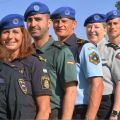The 60-year-old Dutchman is passionate about Oranje. Even though he is a good example of cross-border, neighborly cooperation in his job and has been working in Düsseldorf on the Rhine for four years, the common ground ends with soccer. The father of three children and grandfather of five feels national. That fits.
Hoofdinspecteur Heijnen - comparable in rank to a German senior police officer - serves as the Dutch liaison officer at the State Office of Criminal Investigation. His home station is the Eenheid Limburg in Maastricht. He spent seven years with the Mobile Task Force (MEK), working closely with the German MEK, was head of the State and Constitutional Protection Department for several years and played a key role in the reorganization of the National Police in the Netherlands. Whether it was organized crime or the refugee crisis in Greece in 2016 - Eugène Heijnen was always there when explosive issues were on the table. This adds up to 44 years in the Dutch police force, the last four of which were spent on secondment in Germany.
As a liaison officer between the national police in the Netherlands and the LKA Düsseldorf, he deals with investigative issues and cross-border crime such as drug offences, human trafficking, ATM blasts, arms trafficking, money laundering and organized crime. "My job is to bring the investigators together quickly so that connections can be analyzed and there are rapid investigative successes," says Heijnen.
"Of course, I'm also happy to answer questions from the police if I can. I'm the oil can between the wheels, so to speak, so that everything runs smoothly."
This cross-border collaboration began a few years ago with an "information table", and is now EPICC in Kerkrade. When Heijnen joined the LKA in 2017, Chief Inspector Cordula Kolbinger moved from the LKA to the Netherlands and now works as a liaison officer at the "Landelijke Eenheid" in Driebergen. The common goal was and is to fight crime together and effectively. Also with the help of tax investigations, municipal administrations and permit checks in order to exhaust all possibilities, such as the EURIEC project in Heerlen in the Netherlands. "We are united by the question of how authorities can make themselves more resilient against criminals. The most effective and sustainable tools and strategies were developed with the help of the expertise of the various experts in the countries. First between the Netherlands and Germany and then, of course, together with Belgium," says Heijnen, describing the task.
The importance of cooperation in police work between the three countries was also emphasized by NRW Minister of the Interior Herbert Reul during his visit to Kerkrade in July, where Germany, Belgium and the Netherlands have been cooperating across borders since 2005 in a working group of police authorities in the Euregio Meuse-Rhine based on the principle of shared desks. "This shows the success of exemplary, long-standing and trusting cooperation across national borders," said Reul. "Criminals need to know that they have no safe havens and that their persecution does not end at national borders."
Eugène Heijnen is well aware of the particular challenges in police work. "We are sovereign states with different laws. The call for new, harmonized laws quickly becomes loud, but there are differences. If we come together to fight crime, we have to accept this and take new approaches to investigations." So there are different approaches. However, with understanding and insight into each other's working methods, new energy is generated in the fight against crime and the overlap is growing. Heijnen believes that encounters at the LKA between colleagues from the Netherlands and Germany, such as the Culture Day at the LKA, are extremely important for further successful cooperation. "We looked at cultural differences and how they come about. If you know what makes the other person tick, it's simply easier."
In future, the Hoofdinspecteur would like to see even more joint police teams patrolling together and working across borders. The control centers also work together across borders. This gives them direct information on previous operations or personal information, for example whether a weapon could be involved or whether there has already been domestic violence. This information can save lives and is important for the police officers who intervene. "It would be good to have joint control centers that can also use the social media of both countries as a source of information. This would allow dangerous situations to be dealt with even better thanks to better information and the language skills available in cross-border situations." To further promote this cooperation, Dutchman Heijnen drives the 76 kilometers from his home in Brunssum in Holland to his desk in Düsseldorf in the morning. And back in the evening.
